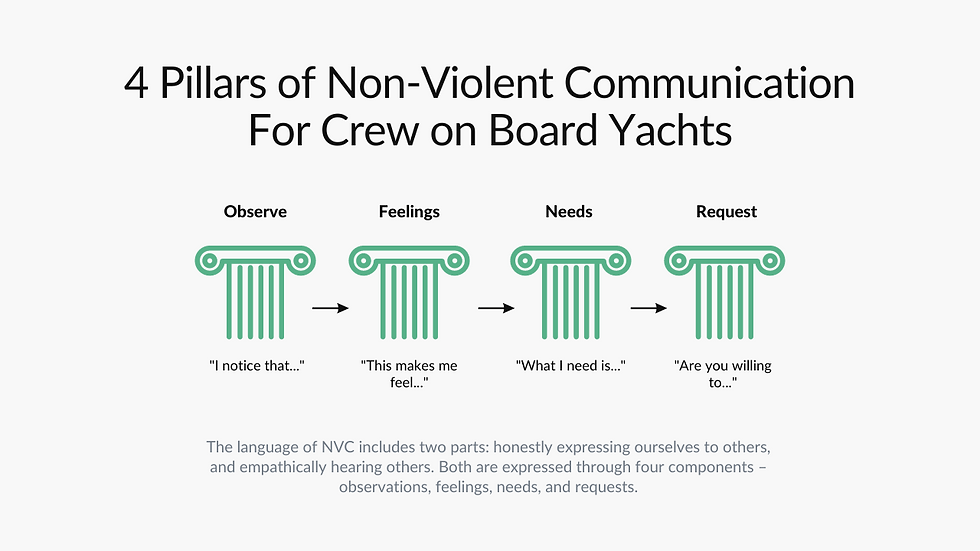- Laurence Lewis

- Feb 28, 2023
- 3 min read
Updated: Mar 2, 2023
I was recently listening to a webinar on bullying and harassment and was saddened, but mostly concerned for the crew listening in, that at no time was the concept of Non Violent Communication addressed.
The vibe emanating from the webinar seemed to imply that bullying and harassment was to be expected and various ways of dealing with it after the fact were discussed. Yet, NVC is a powerful tool, a fundamental concept developed by extraordinary psychologist and renowned world peace maker Dr Marshall Rosenberg in the 60's and 70's which, when applied well, can help prevent bullying and harassment in the first place.
By investing time and effort Captains, Heads of department and in fact all crew can develop and foster a strong preventive approach to bullying and harassment. We have probably all observed in our own life that aggressive communication leads to more hostile and antagonistic communication, it's a vicious circle ; NVC is part of the solution and the beauty of it, is that is can be straightforward to implement.
Through Non Violent Communication on board, conflict resolution becomes easier and crew can avoid simple disputes and resolve difficult ones effectively. The approach is also useful in situations in which crew basically don't mean to be treating each other badly but do so, sometimes unknowingly, simply because they don't understand one another's needs and feelings.
The four pillars of NVC are : Observation, Feeling, Needs, Requests. Let me give you an example : A crew member feels picked on by another colleague because of their accent, which is the butt of many jokes in the crew mess.

1) Observation : In a calm and peaceful manner/ voice state the fact(s) that are leading you to feel the need to say something. "I noticed that for the 10th time, today, at the lunch table in front of everybody, you were making fun of me because of my accent. " This is about facts, note the choice of the word "noticed"
2) State the feeling that the observation is triggering in you. "When you do this I feel hurt / embarrassed/ sad/ uncomfortable/ disrespected/ ashamed/ and not part of the team"... basically, here you need to open up to what your real feelings are. This is about you. Perhaps you feel angry or outraged, only you know what you feel and you need to use the words that best describe this.
3) State your need : "I need to feel accepted for who I am / I need to be comfortable around everybody in the crew / I need to feel like I can speak freely and be myself"... again this is about what your needs are.
4) Make a concrete request for action to meet the need just identified : "I need for you to please understand this and stop making these jokes, from today".
Depending on what the problem is, if it is more intricate, on point 4 the other person should be able to suggest an alternative solution.
There are of course limits to Non Violent communication; it can work very well when people are accidentally hurting each other, but less so when it is done repeatedly on purpose. But to really know if it is done on purpose, you should start with the above steps.
There is a lot to say about this topic, I've only just scratched the surface and there are certified trainers in this method if you wish to investigate further.
Dr Marshall Rosenberg wrote various books on this topic and you can consult the website www.nonviolentcommunication.com provided by PuddleDancer Press where you will find a wealth of information if you wish to progress.


















.jpg)